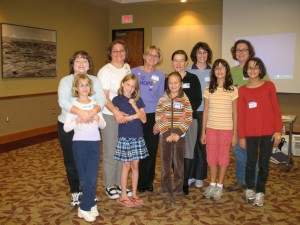 Last Saturday I was happy to be invited as a guest to the Hillsboro, Oregon, public library mother-daughter book club meeting. Gretchen Olson, author of Call Me Hope, was also there to talk about her book and the Hands & Words Are Not For Hurting Project, which received a portion of the advance for Call Me Hope. A great group of moms and daughters had gathered that morning to meet Gretchen and hear her perspective on the book while also talking about their own thoughts. I loved being in on the conversation. And I admired the commitment of group members who came out at 10 a.m. on a Saturday morning to be part of the meeting. I know how difficult it can be to get kids out of bed and out the door on a non-school day.
Last Saturday I was happy to be invited as a guest to the Hillsboro, Oregon, public library mother-daughter book club meeting. Gretchen Olson, author of Call Me Hope, was also there to talk about her book and the Hands & Words Are Not For Hurting Project, which received a portion of the advance for Call Me Hope. A great group of moms and daughters had gathered that morning to meet Gretchen and hear her perspective on the book while also talking about their own thoughts. I loved being in on the conversation. And I admired the commitment of group members who came out at 10 a.m. on a Saturday morning to be part of the meeting. I know how difficult it can be to get kids out of bed and out the door on a non-school day.
Gretchen is a passionate supporter of the Hands & Words Are Not For Hurting Project, and she hopes that her book will inspire readers to take on a service project involving the group, which provides educational materials that can be used in schools among other things.
Here’s a picture of the group with Gretchen, who is in the middle wearing purple.
And here’s my review of Call Me Hope.
Hope Marie Elliot is eleven years old and in sixth grade. She has a lot to hope for: that her verbally abusive mother will stop calling her stupid and making her feel as though everything she does is wrong, and that she will get to go to Outdoor School at the end of the school year. But Hope is aptly named, and while her mother’s insults continue unabated, she begins to form a refuge for herself. She throws her energy into school work and takes on a challenging project related to Anne Frank’s diary, which her class is reading. She forms a friendship with two women who own a consignment clothing shop, and works to earn clothing for herself. She makes new friends at school, and begins to see her school counselor as someone she can open up to.
She is surprisingly independent for a girl her age, but much of her independence is forged from neglect. When Hope could be drawing inward and closing up, instead she reaches out and sees that the wide world is not necessarily like the one she experiences at home. And that gives her courage to reach out for more. Underlying much of the book is the recognition that while physical abuse is no longer accepted, verbal abuse is often still ignored or dealt with awkwardly.
Call Me Hope is told simply through the words of the young protagonist, and it is richly layered with many themes. Some of the questions it asks readers to ponder: What is verbal abuse? How does a parent’s verbal abuse affect members of the whole family, especially when it’s directed at only one sibling? How do voices from the Holocaust have meaning for and inspire us today? What impact does a loving community have on a child’s emotional well being? Is there hope for change?
Author Gretchen Olson has written a book that shines a light on an issue that isn’t talked about much, while giving us a character, Hope, who will burrow into your heart and stay for a while. Highly recommended for ages 9 and up.


